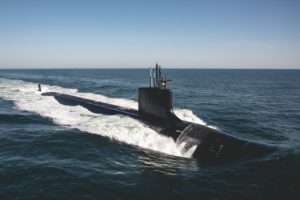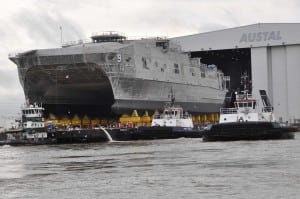The Navy portion of the House Armed Services Committee’s draft of the fiscal year 2021 defense authorization bill approved Tuesday would add two vessels over the Senate version and argued a second attack submarine is needed to maintain the Columbia-class schedule.
The final HASC markup recommends authorizing the first Columbia-class ballistic missile submarine, two Arleigh Burke-class DDG-51 destroyers, one FFG(X) frigate, and two Navajo-class T-ATS towing, salvage, and rescue ships as requested by the administration. However, it also adds a second Virginia-class attack submarine and a Spearhead-class Expeditionary Fast Transport (EPF) vessel.

The House and Senate both restored some Virginia-class funding cut by the president’s budget request, but the House version includes an overall additional $2.6 billion to fully fund a second attack submarine and continue advanced procurement to keep up the two per year production pace (Defense Daily, June 25).
In contrast, the Senate’s NDAA supports the administration’s ship number request but only added $472 million over the request in advanced procurement for Virginia-class submarines to preserve the option to procure the full 10 vessels in the multi-year procurement contract (Defense Daily, June 11)
SASC Ranking Member Jack Reed (D-R.I.) told reporters last month the basic amount of advanced procurement would be $250 million and they put in $472 million instead.
However, a HASC committee aide told reporters that amount does not actually fund a second submarine since the second FY ’21 vessel previously received its advanced procurement approval.
During the full HASC markup, Seapower Subcommittee Chairman Joe Courtney (D-Conn.) had a committee staffer argue that if the second FY ’21 boat is not authorized and appropriated in this budget it could impact the Columbia-class workforce and jeopardize its schedule.
The staffer said the shipbuilder will still build a second Virginia boat due to the multiyear contract, but this would only move other work forward so they could maintain the current schedule. Then, by the end of FY ’23, the builder will run out of Virginia-class work to do and start laying off recent hires, who they expect to also work on the second year of Columbia-class submarines.
“So if a second submarine is not authorized or appropriated in FY ‘21, we’ll see an impact to Columbia in FY ‘23 and at that point there’s very few levers for the Navy to even pull to try and help that workforce and help correct the Columbia,” the staffer added.

Courtney argued the committee has worked to sustain a two attack submarine per year build rate since 2011 to mitigate the long term decline in the submarine fleet as older vessels reach the end of their service lives.
Congress has “already previously approved $1.1 billion to support a second 2021 submarine. We have heard from Navy officials again and again that there is industrial base capacity to support a second submarine in 2021 and that restoration of that platform is their number one unfunded priority. That represents the most cost effective and least disruptive way to mitigate our declining fleet,” Courtney said.
The committee separately approved an amendment sponsored by Rep. Bradley Byrne (R-Ala.) within the chairman mark’s en bloc set of amendments to authorize a Spearhead-class Expeditionary Fast Transport (EPF) in FY ’21.
The EPF is funded with $260 million via shifting $119 million away from Air Force procurement for the KC-46A, $121 million from the Air Force MC-130J procurement funds, and $20 million from the LCS Mine Countermeasures Mission Modules funding.
HASC Seapower Subcommittee Ranking Member Rob Wittman (R-Va.) also noted their bill also funds six more P-8A Poseidon aircraft over the request with an additional $1.02 billion.